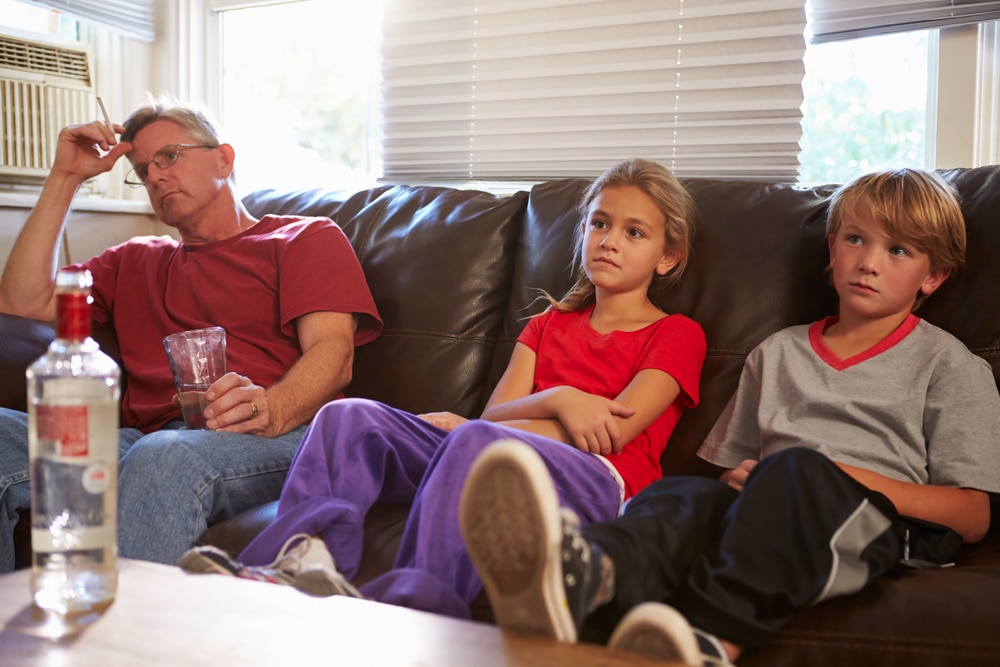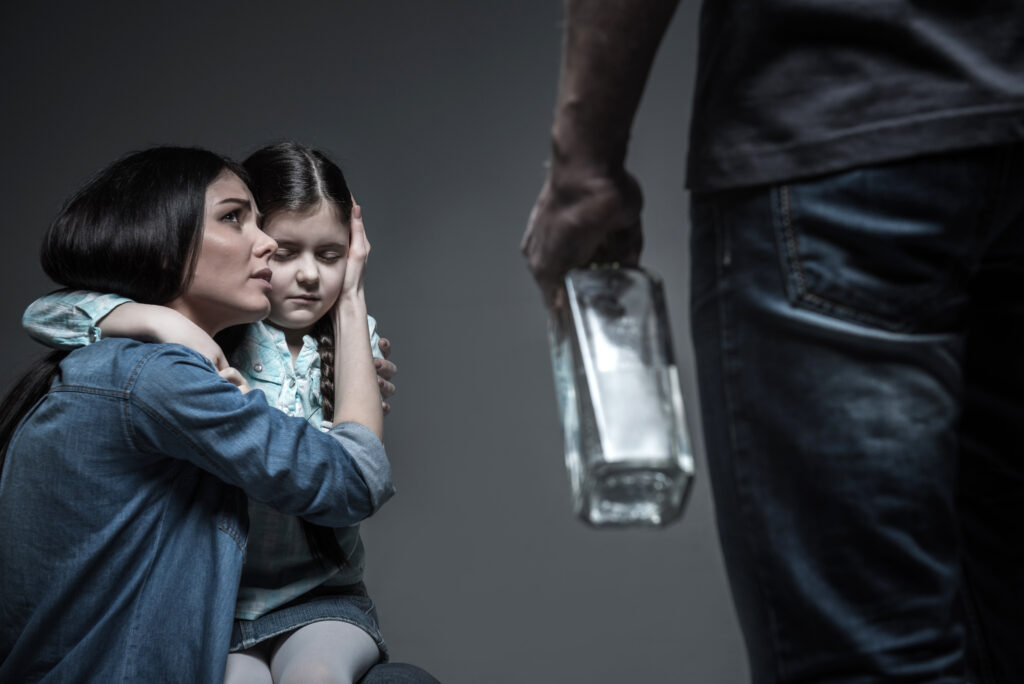Dealing with an alcoholic parent has a more significant impact of alcohol abuse on children than most are aware. Not just alcoholism, but an addiction of any kind causes problems for the substance abuser’s family finances, psychological well-being, and physical health.
The effects of alcoholism on families creates long-lasting, adverse effects on the children in the household, but those effects eventually reach the alcoholic’s extended family.
A family instinctively forms an equilibrium contributed to by all members’ inherent and learned traits. Substance abuse creates a breach in this cultivated existence that must be rectified by the other members of the family, often placing undue responsibilities on adult children who aren’t ready to take them on.

The Impact of Alcoholism on Children And Family
A family with an alcoholic member adapts to the conditions imposed by their addiction. Children, especially more adult children, are particularly sensitive to these inequities and often take on distinct “survival roles” as a means to an end. These roles serve as coping mechanisms during the children’s formative years, but the behaviors that stick often hamper their development and success in their adult lives. In addition to generally taking on more parental duties, some of the typical roles are:
The Enabler
This family member, which is not always a child, picks up the slack created by the effects of alcohol abuse. Mostly possessing a tight bond with the alcoholic, the enabler will take on additional responsibilities permitting the alcoholic to continue his or her substance-abusing ways, often at high personal cost. The facilitator sees themselves as protecting their family by acting this way, although they do more harm than good.
The Hero
Often the eldest child in the family, the hero, is perceived as helpful among his or her family members and successful by their peers, achieving high proficiency in academics, athletics, etc. However, these actions typically compensate for their unexpressed, negative feelings stemming from problems at home or elsewhere.
The Lost Child
This person operates under the rest of the family’s radar, always quiet, regularly going unnoticed, and often absent. The lost child realized early that the best way to stay out of trouble is never to seek attention, seeking out a marginalized existence amid the turmoil caused by his or her conspicuous relatives and this is not good for their mental health.
The Mascot
This role is typically occupied by the youngest child in the family who generally gets along with everyone and commonly defuses conflicts. Non-problem family members attempt to shield the mascot from the true nature of their household problem, although this child is aware that not everything is as it should be.
The Scapegoat
This child is the most vulnerable to experience mental health problems and frequently misbehaves as an expression of his or her feelings towards the alcoholic in the family, distracting the others from the root problem, and commonly receiving the blame for internal ills but soon becoming desensitized to it.
The nature of substance abuse is such that many alcoholics are aware on some level of the negative changes that they are bringing out in their family structures and development of their children and feel ashamed of their actions. However, they are either unwilling or unable to take control of their addiction, incurring further damage to their families despite their better natures.

What’s it Like Dealing with an Alcoholic Parent
Dealing with a parent with alcohol addiction is a challenging task that can affect how you act and feel. It can also transform your family life, causing a different challenge for each person to face. Listed are some common examples of the effects of alcoholism on families:
How people may feel:
- Sad, angry, or embarrassed from the effects of alcoholic parents
- Concerned about their parent’s safety or health
- Worried about siblings, the other parent, yourself
- Scared or alone
- Frustrated when alcohol abuse doesn’t improve
- Relieved when a parent agrees to receive addiction treatment
- It’s challenging to relax or to trust
- Overwhelmed
- Anxious, depressed and having mental health issues
How people may act:
- Refrain from upsetting a parent who abuses alcohol
- Attempting to stay out of an alcoholic parent’s way
- Won’t ask for what they need
- Hold their feelings to themselves
- Keep their parent’s alcoholism problem a secret
- Hide what home life is like
- Avoid having friends over due to the effects of alcoholic parents
- Missing or having difficulty keeping up with schoolwork
- Argue with the parent who abuses alcohol
- Hurt themselves
- Pretend not to care, even if they’re hurting
How family life may be affected:
- Parents with alcohol abuse problems have difficulty paying bills or keeping a job
- There’s not enough money or food
- Adult children of alcoholics start taking care of the younger children
- Alcoholic parents abuse, mistreat or neglect their young and adult children
- The alcoholic parent drives drunk
- Younger children end up living somewhere else to be cared for while adult children of alcoholics start living alone and working
- Parents divorce
- Friends or family step in to help
- The alcoholic parents receive treatment and recover
Effects of Alcoholic Father on Daughter or Son
Despite growing up under the shadow of alcoholism, children who are dealing with parents suffering from alcohol addiction are twice as likely as those without an alcoholic parent to abuse it later in life despite witnessing the destructive nature of addiction firsthand. Additionally, children exposed to alcoholism, more so at an early age, take on a higher risk of developing crippling emotional imbalances, mental health problems and self-destructive behaviors that persist well beyond adolescence.
While genetics hold a powerful influence on how children react to their parent’s substance abuse, either picking up behavioral issues or abusing alcohol themselves, later on, learned behavior can transcend genetics and be passed on.
Growing up in an alcoholic or a dysfunctional household, in general, can cause a host of unhealthy behaviors such as:
- An overactive fantasy life
- Compulsive behaviors like perfectionism and inflexibility
- Fear of being vulnerable
- Low Self Esteem
- Fear of failure or success
- Inability to have fun
- Intimacy issues
- Overriding insecurity
- Problems accepting or sharing responsibility
- Trust issues
- Unresolved negative feelings such as anger, fear, shame, etc.
How Adult Children of Alcoholics Are Affected
While there is no one definitive answer to this question, it is generally agreed that adult children of alcoholics (ACOAs) tend to experience a range of negative consequences as a result of growing up in an alcoholic home. These can include everything from emotional trauma and behavioral problems to difficulties in forming healthy relationships. Additionally, adult children of alcoholics (ACOAs) are also more likely to develop drinking problems of their own. If you are the adult child of an alcoholic, it is important to seek out support and resources to help you deal with the unique challenges you face.
PTSD symptoms in children
PTSD in children due to alcoholic parents is not uncommon. In fact, children of alcoholics are four times more likely to develop PTSD than children from non-alcoholic homes. According to the Substance Abuse and Mental Health Services Administration (SAMHSA) children with PTSD may have some or all of the following symptoms:
Re-experiencing the event: Kids may relive their childhood trauma over and over in their minds. They may have bad dreams and nightmares, and they may act out what happened during playtime.
Avoidance: Kids may try to avoid anything that reminds them of the event, including people, places, activities, objects, and words. They may refuse to talk about what happened or even pretend it never did.
Negative changes in beliefs and feelings: After this emotional trauma, kids may see themselves and the world differently. They may be more irritable, angry, and impulsive than before, and they may have trouble trusting other people.
Changes in physical and emotional reactions: Kids with PTSD may become easily upset or angered. They may seem to be “on edge” all the time, and they may have trouble sleeping or concentrating. Physical symptoms may include headaches, stomachaches, and sweating.
Grandparents as Parents
Irresponsible parenting often forces grandparents to take over and raise their grandkids as if they were their kids instead. The United States has experienced a surge of children raised by their grandparents over the last 30 years. For instance, the amount of grandparent-headed households raising children went up 66 percent between 1990 and 1997. By 1997, there were 2.4 million households in which grandparents were the primary guardians of children.
An external factor often causes familial roles to shift, such as sudden unemployment of one or both parents, military deployment, or severe illness or death in the family. In the case of substance abuse having internal roots, the cause may be attributed to one or both of the parents having a mental condition.
For instance, borderline personality disorder contributes to parents’ neglect of their children or antisocial personality disorder, which prevents alcoholics from displaying healthy, normal parental behavior.
A third cause is an alcohol or drug addiction of some kind, which can result in behavior similar to the symptoms of the above two mental disorders. Depending on the severity of the addiction, these behaviors might disappear when the alcoholic gets his addiction under control.
A grandparent seeing their grandchild being raised in a dangerous environment hardly has a choice. Taking action can mean saving the child or children from a life of substance abuse and potentially passing on this learned behavior to their child.

Impact of Alcoholic Parents on Children – What To Do?
If you’re dealing with an alcoholic parent, you may feel you could use some help and advice. A few ways of reaching out to others for safety, guidance, and support include:
Opening Up to Someone
Talk to good friends and other adults that you trust. For example, a relative, counselor, teacher, doctor, or therapist. Fill them in on what you’re going through. You may find relief in sharing your experiences, and they may be able to help you.
Recognize That It’s Not Your Fault
Some people dealing with the effects of alcoholic parents blame themselves for their substance abuse. They may think back to times when the alcoholic parent was mad at them. They may question if they caused the alcoholic parent to drink. But children can’t create a parent’s alcohol addiction.
Know and Identify Your Emotions
Don’t conceal your feelings by pretending that everything’s OK. Identify how a parent’s alcohol abuse makes you feel and know it’s OK to feel upset. Use your words to communicate how you feel and why.
Join A Support Group
Find a support group like Al-Anon/Alateen or go online. Talking to others with similar situations or who have once been there can help you cope.
Develop Good Habits
Some people learn not to speak up or show emotion because they believe it will trigger parents to drink. These practices may help you survive at home, but they won’t work throughout life. Having the ability to show emotion, speak up, and say how you feel will help create stable adult relationships.
Sometimes people require therapy to build good habits because they’re unable to learn them while dealing with a parent with substance use disorder.
Stop the Cycle
People who deal with alcoholic parents’ effects are at higher risk of also becoming alcoholics. Support groups or therapy can teach you how to avoid this risk.
Alcohol Addiction Treatment Options
Get Help Today
If you’re dealing with a parent or loved one with a substance use disorder, you need to know that those actions can have a permanent, negative effect on those around you, particularly adult children. In addition to adapting behavioral and mental health issues, they might develop an alcohol problem themselves later in life. If you’re a grandparent with an alcoholic child, you don’t want to see your grandchild or grandchildren pick up the same behavior. So get help today!
There are many different alcohol addiction treatment options available today. Treatment for alcohol addiction and other substance use disorders can be done in an outpatient or inpatient setting, and usually involves some form of detoxification, followed by counseling, family therapy, group therapy and aftercare.
Behavioral Health Centers can help you and your family overcome alcoholism together. We are a comprehensive recovery center located in scenic Port St. Lucie, FL, specializing in drug and alcohol dependence, mental illness, and dual diagnosis. Contact us today to learn more.





